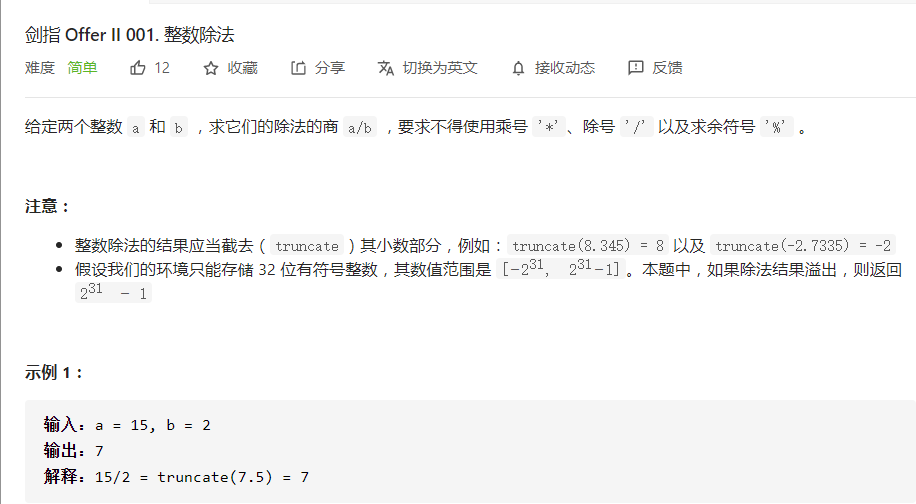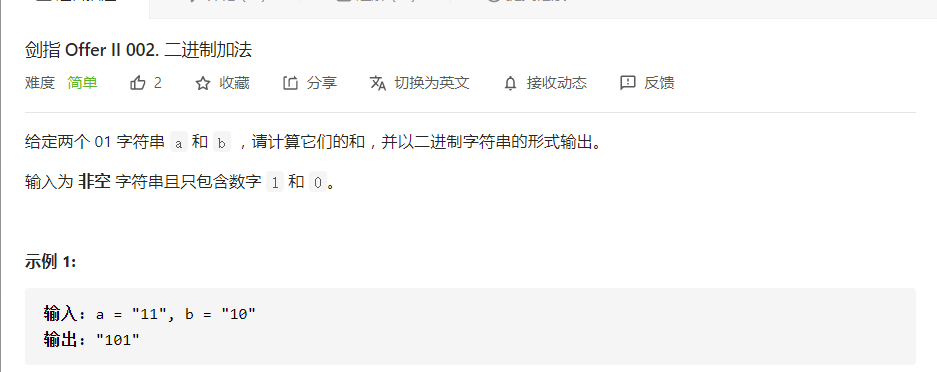Integer division

thinking
-
Cross border problem
- Critical point negative 0x8000000, positive 07fffff
- Convert a and b to negative numbers, and the highest bit can be used.
- The problem becomes a loop, which is a < = B
- Critical point:
- a==0 return 0;
- if ((a == 0x80000000 && b == -1) || (a == 0x7fffffff && b == 1)) return 0x7fffffff;
if ((a == 0x80000000 && b == 1) || (a == 0x7fffffff && b == -1)) return 0x80000000;
-
Subtraction implementation
- a=a-b, but the operation is too cumbersome. b+b each time; Until b+b < A; The amount of b subtracted is twice the increase.
- Use two variables temp = temp + temp; Count = count + count 2x increase, similar to shift left
- In the process, a two-dimensional array vectortc[2] is used to store temp and count, and there is no need to accumulate from scratch next time
- Temp here is also a negative number out of bounds, so temp > 0xc0000000 should be satisfied;
- When temp + temp > A is not satisfied with subtraction, the appropriate temp and count will be obtained directly from the vector next time
- pop operation is required after obtaining. The last one is temp=b, count=1; At most, it won't be smaller.
int divide(int a, int b) {
if ((a == 0x80000000 && b == -1) || (a == 0x7fffffff && b == 1)) return 0x7fffffff;
if ((a == 0x80000000 && b == 1) || (a == 0x7fffffff && b == -1)) return 0x80000000;
if (a == 0) return 0;
bool flag = (b < 0 && a < 0) || (a > 0 && b > 0) ? true : false;
//Turn negative
a = a < 0 ? a : 0 - a;
b = b < 0 ? b : 0 - b;
int div = 0;
//Record temp and count
vector<int>tc[2];
int temp = b;
int count = 1;
while (a<=b)
{
if (tc[0].empty()) {
while (temp > 0xc0000000 && temp + temp > a)
{
tc[0].push_back(temp);
tc[1].push_back(count);
temp = temp + temp;//move
count = count + count;
}
}
else
{
while (temp < a&& !tc[0].empty())
{
temp = tc[0].back();
count = tc[1].back();
tc[0].pop_back();
tc[1].pop_back();
}
}
//Same position.
a = a - temp;
div = div + count;
}
div = flag ? div : 0 - div;
return div;
}
Binary addition

thinking
- The two strings a and B are traversed from the tail and added to the string in reverse order after completion.
- The addition of characters ch=A -'0 '+ B -'0' + C has only one '0', ensuring that '0' < = ch < ='3 '
- If ch > = 2, carry and CH minus 2; If not, modify C to '0'
- One cycle ensures that both a and b can traverse, make a judgment on endA and endB, and then copy [faster, low code repetition rate]
- Finally, judge whether C is' 1 '. If yes, it needs to be added again
string binaryAdd(string a, string b) {
string add="";
//XOR from last
// 0 0 =0 ,0 1= 1,1 0=1,1 1=0==>c[i]=1
// add flashback insertion. Just reverse the order
int endA = a.length() - 1;
int endB = b.length() - 1;
char C='0';
char ch;
while (endA>=0||endB>=0)
{
int A = endA >= 0 ? a[endA--] - '0' : 0;
int B = endB >= 0 ? b[endB--] - '0' : 0;
ch = A + B + C;
//cout <<ch<< endl;
if (ch >= '2') {
C = '1';
ch = ch-2;
}
else {
C = '0';
}
add += ch;
}
//If there is another C at the end, add it directly
if (C == '1')
add += '1';
//A reverse order
reverse(add.begin(),add.end());
return add;
}
The number of 1 in the first n binary

thinking
- Whether to carry depends on k-1%2 the situation
- (k-1)%2==0, then the number is the previous + 1
- If not, carry. It can be regarded as (k-1)/2, and the + 1 operation is the next bit of (k-1)/2.
a r r [ i n d e x ] = { a r r [ i n d e x − 1 ] + 1 ( i n d e x − 1 ) % 2 = = 0 a r r [ ( ( i n d e x − 1 ) / 2 ) + 1 ] ( i n d e x − 1 ) % 2 ! = 0 arr[index]=\left\{ \begin{matrix} arr[index-1]+1 ~~~~~~~~~~~~ (index-1)\%2==0 \\ arr[((index-1)/2)+1] ~~~~~~~~(index-1)\%2 !=0 \end{matrix} \right. arr[index]={arr[index−1]+1 (index−1)%2==0arr[((index−1)/2)+1] (index−1)%2!=0
vector<int> countBits(int n) {
vector<int>arr;
arr.push_back(0);//0 go in first
int index = 1;//Start with 1
while (index<=n)
{
if ((index - 1) % 2 == 0)
arr.push_back(arr[index - 1] + 1);
else
arr.push_back(arr[((index - 1) / 2)+ 1]);
index++;
}
for (vector<int>::iterator it = arr.begin(); it != arr.end(); it++) {
cout << *it << " ";
}
return arr;
}
A number that appears only once

Simple sort space complexity O(lgN)
thinking
- Sort first
- Judge whether the ending is a single existence
- The left and right adjacent data of a single existence are different from it
int easySingleNumber(vector<int>& nums) {
int num=0;
int len = nums.size() - 1;
if (len == 0)
return nums[0];
if ((len) % 3 != 0)//Input error
return 0;
sort(nums.begin(), nums.end());
//The other three are the same. Find the one that is different from the previous one
//Look at the head and tail first: because there is the possibility of crossing the border
if (nums[0] != nums[1])
return nums[0];
if (nums[len] != nums[len-1])
return nums[len];
for (int i = 1; i < nums.size()-1; i++) {
if (nums[i - 1] != nums[i] && nums[i] != nums[i + 1]) {
num = nums[i];
break;
}
}
return num;
}
Bit operation space complexity O(1)
thinking
- If there are three numbers that will be the same, it is proved that their addition% 3 = = 0;
- Integer has 32 bits. Traverse the array and add the bits of each bit. This bit must be bit%3==1 or 0
- Use count to record the bit addition of this bit [current num data = num shift right (31-i) bit & 1]
- If count%3 is 1, the single data bit is 1. Otherwise, it is 0
- Directly obtain the first k bits, and advance the existing (k-1) bits by one + (bit%3= 0)
int singleNumber(vector<int>& nums) {
int result=0;//Store results
for(int i=0;i<32;i++){
int count=0;
//Traverse the array to add the bits
for(auto num:nums){
count+=(num>>(31-i))&1;
}
//Get the first i bit
result=(result<<1)+(count%3!=0);
}
return result;
}